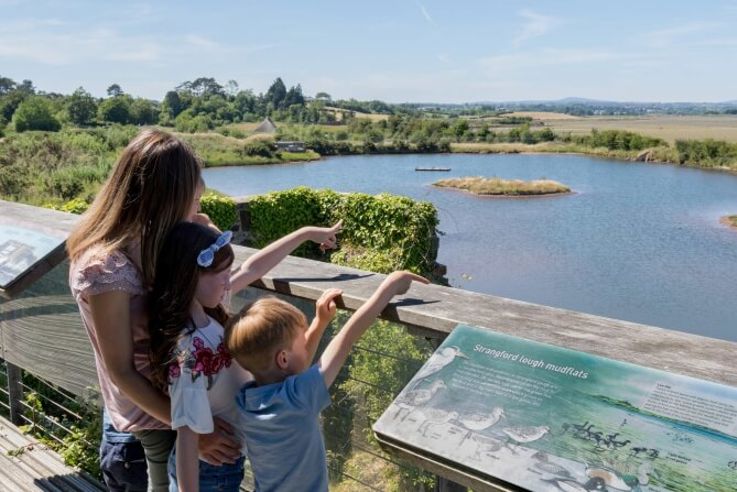Part 3: Water Quality and Tourism
Contents
Part 3: Water Quality and Tourism
Water plays a massive role in the tourism industry. From kayaking to surfing, swimming to boat tours, it is essential that we protect this precious resource.

As part of the water Framework Directive, Northern Ireland has committed to get all of its water bodies up to atleast “Good Status” by the year 2027. Everyone can play a role in making this target a reality. Here are some tips to get you started.
Store chemicals properly
If we don’t keep track of our chemicals, they can make their way into water bodies. Many chemicals we use daily like bleaches, detergents and solvents can have detrimental effects if they reach an aquatic environment. Excess usage can also put pressure on our treatment plants as these chemicals must be removed from effluent before it can be safely discharged back towater bodies. Things go wrong when these chemicals are left out and about with no accountability. Have a designated area where chemicals are stored. Ensure that their containers are tightly sealed and that they are kept in their original containers so that dosing can be done appropriately and expiry dates can be identified.
Ensure proper disposal of hazardous materials
Everything has a shelf life,there are no exceptions. Material goods like batteries, oils, pesticides, paints and chemicals won't last forever. When they expire, it can be very tempting to dispose of them with your general refuse. Resist the urge to do this. Many of these products contain hazardous materials that can be harmful to both human health and the environment. By disposing of these chemicals with general refuse your risk these products making their way to our beautiful waterways and not only damaging aquatic life but also to our water supplies. For guidance on how to manage hazardous waste contact your local council and check out this link here.
Check that oil tanks are bunded
If you use heating oil on your property, it would be wise to give your tanks a quick inspection once a year. Oil can cause mayhem in an aquatic environment and can lead to fish kill incidents. Prevention is better than cure as oil spills can cost thousands in remediation and can even result in the loss of access to groundwater supply. Check to see if your tank is bunded. A bund is a small wall around the tank that in the event of an oil spill will help contain the oil. Is there a roof over your tank? Leaving your tank open to the sky can result in your bund ending up full of water, rendering it useless. Check joints for leaks and inspect the tank for cracks and signs of weathering.
Check grease traps are serviced
Be aware that there are legal requirements in place to prevent fat, oil and grease entering drains and sewers. Failing to adhere to these can leave you ending up in hot water. Strainers in sinks can help capture larger scraps going down drains. For fats, oils and greases ensure your grease trap is serviced and regularity maintained. Your provider should provide guidance on how often you should clear the trap depending on your usage. Grease can result in blockage which can lead to bad smells aswell as out of sewer flooding.
Reduce your pesticide usage
While they may make your life easier, there is always a catch with pesticide usage. There is mounting evidence that many ofthe pesticides that we take for granted can have adverse effects for both biodiversity, like our pollinators, aswell as human health, with many now being shown to be potentially carcinogenic. A single drop of MCPA, a pesticide used for control of rushes, can breach the drinking water limitin a small stream for up to 30 kilometres! Businesses should look to reduce dependency on pesticide usage and look to the growing field of alternatives that are coming out.
Be mindful of what goes down the drain...
While it might seem like you are washing away your problems, in reality you are diverting your problems elsewhere. Storm drains in Ireland do not receive any form of treatment. This means that anything entering these drains will arrive at a water body as it is. These might be popular tourism destinations that your business depends on like Lough Neagh or the River Bann. They also might just be the very place that the water you pour from your tap to drink is extracted from.
Riparian Strips
Allow vegetation to grow along the banks of any stream that passes through your premises. This strip of natural vegetation provides many benefits. As water runs off the land this strip will capture pollutants helping to protect the receiving water body. It will also slow down run off helping to reduce the risk of flooding downstream. Lastly, it creates a corridor for wildlife to seek shelter, forage and travel safely. This tip also applies to lakes.
Protecting riverbanks and lake shores.
If your business involves getting on the water (like kayaking, SUP boarding etc.) try to use slip ways for launching and exiting the rivers or lakes. Large numbers of people can lead to the damage and erosion of riverbanks which can introduce silt and sediment to the waterbody. This can adversely affect water quality, choking up the riverbed and affecting spawning grounds of nearby fish like Brown Trout and Atlantic Salmon.